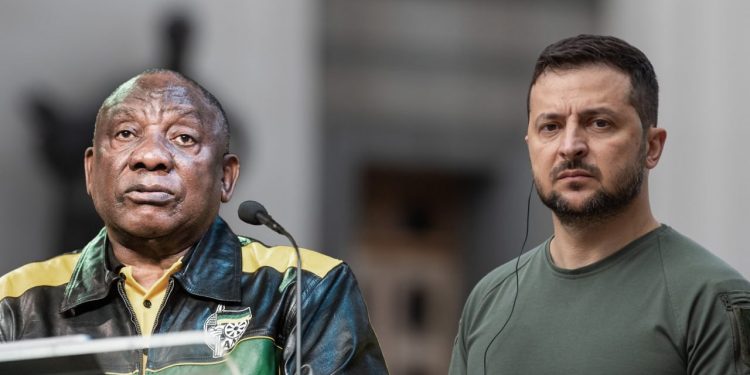In today’s turbulent global arena, few figures encapsulate the tangled web of shifting alliances and conflicting agendas as starkly as Ukrainian President Zelensky and South African President Cyril Ramaphosa. Zelensky, entrenched in a seemingly endless war with Russia, continues to plead for Western military and economic support—even as mounting criticism questions the efficacy of his approach. Meanwhile, Ramaphosa faces the difficult task of navigating South Africa’s deepening ties with BRICS and its strategic rapport with Russia, while also addressing concerns from various international actors who favor a more Western-centric diplomatic stance.
Complicating matters further is the recent move by South Africa to invite Zelensky for talks—a decision that has sparked debate among observers. Some critics argue that this invitation may inadvertently prolong a conflict that continues to claim lives in Ukraine by lending a platform to a leader whose influence appears to be diminishing. Others see the gesture as a sincere effort to contribute to dialogue in a deeply divided international landscape, even if its timing seems questionable given the ongoing challenges. At the same time, this decision diverts attention from other pressing issues, such as the geopolitical instability in the Democratic Republic of the Congo (DRC), where fierce competition for vast mineral wealth has drawn global superpowers into a complex struggle for influence. As a regional power, South Africa’s measured approach in this area remains an important, albeit challenging, aspect of its broader foreign policy.
Adding another layer to this intricate puzzle is the renewed influence of former U.S. President Donald Trump, whose recent calls for peaceful negotiations with Russia stand in stark contrast to prevailing hardline approaches. Trump contends that a diplomatic settlement was always within reach—a settlement that, under his leadership, might have prevented the needless prolongation of hostilities. In his latest round of criticisms, Trump lambasts Zelensky, arguing that his uncompromising stance is not only extending the war but also draining vital resources from the West.
Trump’s critiques extend further to encompass South Africa’s diplomatic strategy. He has pointed to Ramaphosa’s balancing act between engaging with BRICS nations and maintaining ties with traditional Western allies, suggesting that such an approach could leave South Africa isolated on the international stage. This perspective is reinforced by a recent letter from a group of Republican congressmen—Andrew Ogles, Tom Tiffany, Joe Wilson, and Don Bacon. The letter, which was circulated alongside a widely shared photo of the four lawmakers united in purpose, calls for the revocation of South Africa’s benefits under the African Growth and Opportunity Act (AGOA). Notably, these congressmen have argued for banning AGOA privileges solely on the basis of South Africa’s position regarding Israel, contending that this stance deviates from U.S. policy expectations.
The controversy does not end there. Several news outlets have drawn attention to South Africa’s domestic policies, particularly its contentious land redistribution plans. Reports warn that radical land expropriation along racial lines may not only threaten property rights but also destabilize the economy by deterring crucial investment. For Trump and his supporters, these policies represent yet another example of government measures that they argue jeopardize long-term economic stability and stray from securing national interests.
The current geopolitical climate is characterized by a series of missteps and contradictions. Zelensky’s increasingly isolated position, Ramaphosa’s delicate balancing of multiple international interests, and Trump’s vociferous calls for a return to diplomatic negotiation all highlight a world in flux. The invitation extended by South Africa to Zelensky—a move that many see as an endorsement of a lost cause—exemplifies the broader strategic challenges at play. As global powers grapple with instability in the DRC, shifts in U.S. policy, and domestic debates such as South Africa’s land reform initiatives, it is becoming ever clearer that a decisive, coherent strategy is urgently needed. Without such clarity, nations risk being caught between competing influences, left with little more than half-measures that ultimately serve no one’s interests.










